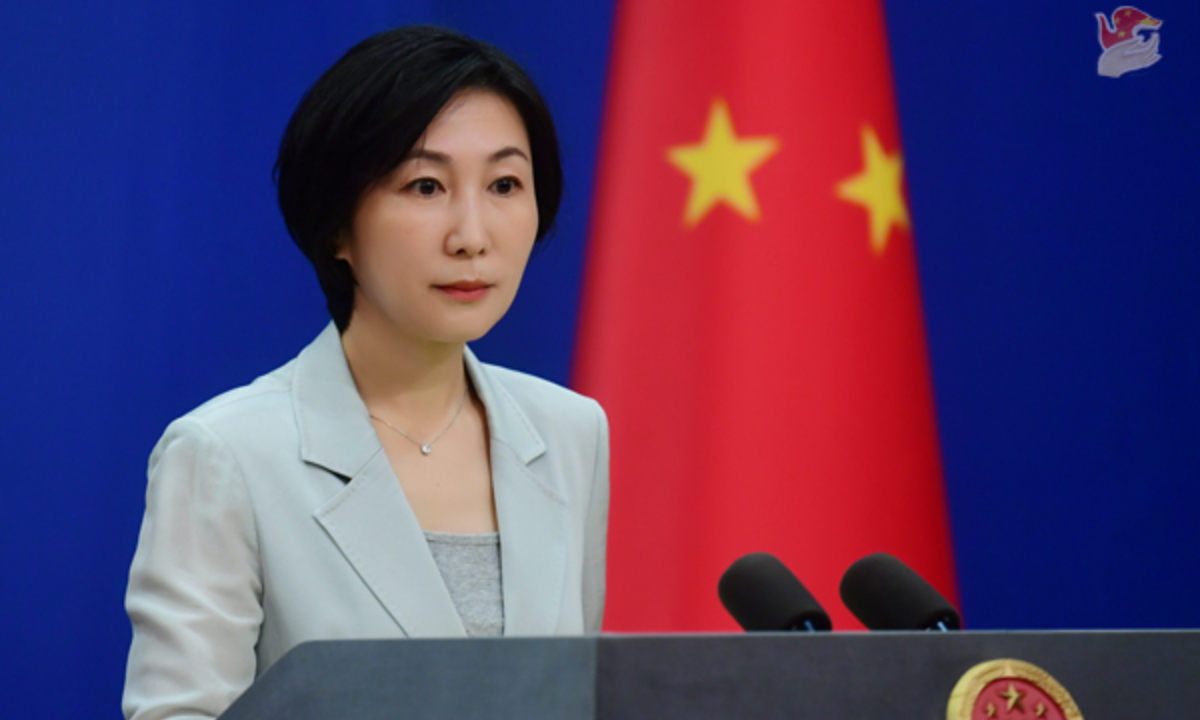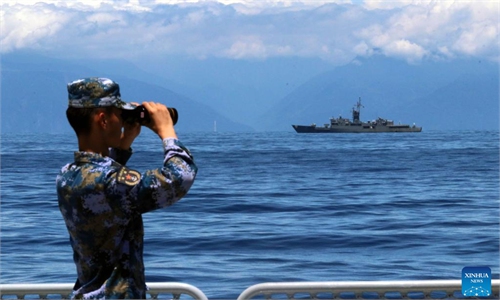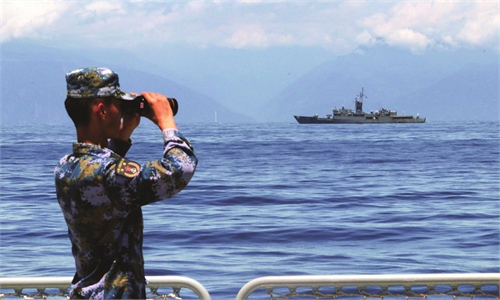US urged to ‘slam the brakes’ on Congress’ provocation as lawmakers land on Taiwan following military sales

Foreign Ministry Spokesperson Mao Ning Photo: Ministry of Foreign Affairs
The Chinese Foreign Ministry urged US politicians to immediately stop any form of official exchanges with China's Taiwan region, and stop sending wrong signals to Taiwan secessionists, in response to the ongoing trip by a US bipartisan delegation led by Representative Stephanie Murphy, vice chair of the House Subcommittee on Intelligence and Special Operations.
Analysts said that China needs to be wary of military and intelligence links between US and Taiwan island authorities, and Beijing will not accept the White House rhetoric of "separation of powers" as an excuse to indulge lawmakers in playing the "Taiwan card," as it's the White House's obligation to "hit the brakes" in a timely manner.
Chinese Foreign Ministry spokesperson Mao Ning on Thursday urged the relevant US politicians to abide by the one-China principle, noting that China will "continue to take strong measures to firmly safeguard national sovereignty and territorial integrity."
Citing Taiwan's defense authority, local media reported on Thursday evening that seven People's Liberation Army Navy vessels and 45 PLA aircraft were detected in areas around the island, and 25 of the detected aircraft (TB-001, SU-30, J-10, J-16, JH-7, J-11 and Y-9 CC) had flown on the eastern part of the "median line" of the Taiwan Straits.
The delegation landed in Taiwan island on Wednesday night. During their meeting with Taiwan regional leader Tsai Ing-wen on Thursday morning, Murphy said she hopes the US and Taiwan authorities will deepen economic cooperation in everything from semiconductors to bun shops. Tsai also expressed expectations of closer economic and trade ties.
Given that some lawmakers in Murphy's delegation are involved in the House's military and intelligence departments, and met with Taiwan region's top security official Wellington Koo, observers said the field of defense is likely to be the real focus.

A view of the Taiwan Straits is seen from Xiamen port, in East China’s Fujian Province. Photo: IC
Wang Yu-ching, a Taiwan cross-Straits observer who lives in the Chinese mainland, said the Chinese mainland should pay close attention to the visit, as Murphy's delegation is the first group from Congress to visit Taiwan after the US' latest arm sales to the region.
On September 2, the US State Department approved a $1.1 billion defense bolster package to Taiwan, the biggest since US President Joe Biden took office.
The US has always promoted the idea of a stable "Taiwan island-US military industrial chain," so that Taiwan region can become an important "resupply base of US-standard weapons maintenance and parts suppliers," Wang told the Global Times.
The US also wants to control Taiwan's intelligence resources through the military chain, Wang said.
With the midterm elections approaching, US lawmakers are trying to do themselves economic and political favors by putting on political anti-China roadshows such as visiting Taiwan region, Xin Qiang, director of the Taiwan studies center with Fudan University and deputy head of the university's US studies center, told the Global Times on Thursday.
The eight-member group led by Murphy is the sixth US group to visit the island following US House Speaker Nancy Pelosi's provocative Taiwan trip. So far this year, a total of 28 US House representatives and Senators (14 Democrats and 14 Republicans) have visited Taiwan region in seven groups, according to Taiwan-based media.
It's also worth noting that Murphy on Thursday said that her visit symbolizes the "rock-solid commitment" from US Congress, which is "as important a branch as the US government," as the bills drafted by Congress do not disappear when administrations change, Taiwan media reported.
Considering the above facts, some analysts believe that after Pelosi's Taiwan trip, domestic factors in the US have stirred up the Taiwan question more significantly, and they worry that US Congress is further seizing the "steering wheel" of Taiwan-related policy making.
Xin said that the White House's ability to influence Congress is indeed declining, which will have an impact on the stability, consistency and predictability of US policy on Taiwan. But on the whole, foreign policy, especially on sensitive topics, mainly lies in the administrative departments, the expert said, noting the need to "slam the brakes quickly" before Congress acts in a way that could lead to a repeat of the Pelosi incident.
"China will never accept using 'the separation of powers' as an excuse for the US government to connive on lawmakers' provocative visits to China's Taiwan region. From the perspective of international law, regardless of the distribution of power within the US, foreign policy should be integrated rather than chaotic and contradictory," Wang Yingjin, director of the Center for Cross-Straits Relations Studies at the Renmin University of China, told the Global Times on Thursday.
"When China and the US established diplomatic ties, it was China as a whole and the US as a whole, including the executive and legislative bodies. Therefore, both US executive and legislative bodies should abide by the one-China principle pledged by the US," the expert said.
The executive branch, including US president, has every right to prevent lawmakers from challenging China's red line in the national interests of the US, and should not tolerate unlimited congressional overreach that undermines China-US relations, he said.



